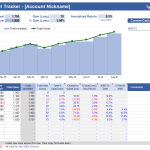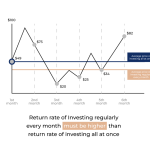Learn from Beginner Investing Mistakes: Your Guide to Smarter Decisions
Investing can be a thrilling journey, but just like setting sail on the open seas, it’s a venture that comes with its own set of storms and choppy waters. Every investor, novice or seasoned, is bound to hit a few snags along the way. However, it’s vital to learn from these beginner mishaps, transforming them into stepping stones towards your financial goals rather than stumbling blocks.
Not Setting Clear Investment Goals
Imagine gearing up for a road trip without a destination in mind; that’s what investing without clear goals is like. Knowing where you want to go is crucial. Are you saving for a dream vacation, your child’s education, or a comfortable retirement? Determining this will help guide your investment choices, risk tolerance, and timeline. Without a set of goals, you might find yourself driving in circles or, worse, crashing into the guardrails of hasty decisions.
Be Patient, Grasshopper
As a new investor, you may get over-excited at the prospect of quick wins. But remember, we’re in it for the marathon, not the sprint. Patience is key in the investing world. Markets have their ups and downs, but history has shown that patience pays off. Get too antsy, and you might pull out your investments at the first sign of trouble, potentially missing out on a bounce-back that could have boosted your returns.
Putting All Eggs in One Basket: Diversify!
There’s a reason why the age-old advice to not put all your eggs in one basket still stands—diversification is essential! Spreading your investments across different asset types, industries, and geographic locations can reduce risk. If one investment goes south, you won’t be left with an empty basket. Diversification helps balance your risks and can lead to a smoother investing ride.
Skipping the Homework
Would you buy a car without looking under the hood? Then why invest in something without doing your research? Understanding the basics of any investment is crucial, whether it’s stocks, bonds, real estate, or a new business venture. Know the jargon, the risks, the history, and the potential. Skimping on research can lead to misunderstandings, misconceptions, and missteps.
Fearing the Market’s Shadow
There’s no sugarcoating it—markets can be scary. They can drop suddenly, causing many to react out of fear rather than logic. But remember, the market’s shadow is often larger than its bite. Market corrections are normal, and panic selling can lock in losses rather than weathering out the storm. Stay calm, stick to your strategy, and consult with a financial advisor when in doubt.
Ignoring the Inflation Bogeyman
Keeping all your savings in your mattress or a low-interest savings account might seem safe, but there’s a silent thief called inflation that eats away at your money’s purchasing power. Smart investors know that one of the ways to battle inflation is through investments that have the potential to provide higher returns over the long term.
Overlooking Costs and Fees
Investing is not without its expenses, and the little fees can add up to big chunks of your investment returns over time. Be aware of what you’re paying in terms of fund management fees, transaction costs, and any other charges that can erode your potential gains. Compare and choose wisely where to put your money, keeping an eye on costs as much as possible.
The Peril of Emotional Investing
Never let emotions drive your investment car. Fear and greed are powerful, and they often lead to poor choices like chasing performance, buying high out of FOMO (fear of missing out), or selling low in a panic. Building discipline and setting rules for when to buy and sell can protect you from these emotional roller coasters.
Unrealistic Expectations: Busting the Myth
You might have heard stories of investors striking it rich overnight, but those are more fairy tale than Wall Street. Set realistic expectations about returns. Most investments grow over time, and expecting to double your money in a short period is a setup for disappointment and risky bets. Aim for realistic, consistent growth, and you’ll be pleasantly surprised in the long run.
Misjudging Risk Tolerance
Are you a daredevil investor or more of a safety-seeker? Knowing your risk tolerance is important because it will dictate how you balance your portfolio. If you can’t stomach major ups and downs, high-risk stocks may not be for you. On the other hand, if you’re okay with some volatility in exchange for potentially higher returns, you might allocate more towards growth-oriented investments.
Half-Listening to Hot Tips and Trends
That hot stock tip from a friend or a trending investment you saw on a financial news site can be tempting, but caution is warranted. Blindly following the crowd can lead you to invest in fads without substance. Instead, use those tips as starting points for your own research. There’s a lot of noise out there, and learning to sift through for sound advice is a skill worth developing.
Forgetting the Taxman Cometh
Taxes are an inevitable part of life, including investing. Forgetting to consider the tax implications of your investment decisions can lead to unexpected bills. Be wise about utilizing tax-advantaged accounts like IRAs or 401(k)s, and understand the tax consequences of buying and selling investments. Consult with a tax professional to make informed decisions.
Conclusion: Take Heart and Invest Smart
Every investor journey begins with a single step, accompanied by the likelihood of a few trips and falls. The key takeaway from beginner investing mistakes is not to be afraid of committing them but to learn, adapt, and build a smarter investing strategy from them. Investing is as much about knowledge and analysis as it is about behavior and discipline. Be patient, do your homework, understand your risks, and plan for the long term.
Remember, the smart investor isn’t the one who never makes mistakes but the one who learns to dance in the rain rather than waiting for the storm to pass. Trust in your newfound knowledge, seek guidance when necessary, and keep your eyes firmly on your financial horizon. Your future self will thank you.


